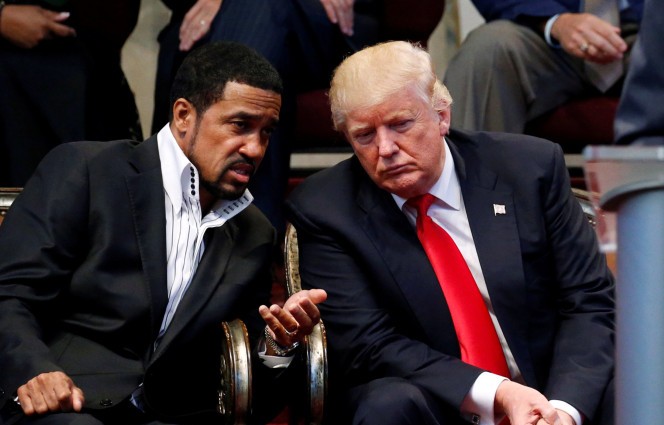Trump’s pastor pal wants to be a ‘black advocate on the right’

Move over, Al Sharpton. There’s a new — more conservative — reverend on the political scene.
“We don’t have a black advocate on the right,” said Dr. Darrell Scott, the Cleveland pastor who is a member of Donald Trump’s transition team. “Think about it: Jesse Jackson — he’s a dinosaur now. Al Sharpton — he’s all the way left. All the black activism and all the black advocacy is on the left.
“But I’ve got the [next] president’s ear now.”
Scott, 58, was among the clutch of prominent black figures, including NFL legends Ray Lewis and Jim Brown, “Apprentice” Season 1 contestant Omarosa Manigault, and Kanye West, who met with Trump in Manhattan on Tuesday.
On the agenda: “Black people, black stuff,” said Scott, who sits on Trump’s National Diversity Coalition.
The former drug dealer and head of the New Spirit Revival Center rails against the welfare system, believes life begins at conception and wants to flip the “racial narrative” plaguing Republicans.
“The Democrats put a victim mentality on black people and make us feel as if we’re being oppressed and identify the Republican Party as the oppressor,” he told The Post.
“Hillary Clinton is further from the black community than Mr. Trump, no matter what accent she uses in the South,” Scott said. “Donald Trump didn’t pull a Hillary Clinton when I first met him: trying to ‘act black.’ She pantomimes us. That proves how far away she is from us.”
The pastor, who said he voted for President Obama but was “never a fan,” is well aware that not everyone in his community agrees with his political views.
“I don’t care if they call me ‘c–n,’ ” Scott said. “[Trump] is my friend and I’m black, so, automatically, the black community has a friend in the White House.”
Introduced in 2011 through televangelist Paula White, Scott was skeptical of Trump at first. “‘What makes you think black people are going to vote for you?’” he recalled asking the mogul, who was then mulling a run for the White House in 2012. “‘You’ve got the reputation on the street of being a racist.’”
Scott, who said he has visited Trump Tower “about a thousand times,” educated Trump on potential linguistic land mines. “I said to him, ‘You can’t say black anymore. It’s African-American now.’ He said, ‘Why not? You say white.’ He said it’s too many syllables.”
Jim Brown, Ray Lewis and Darrell Scott speak to reporters at Trump Tower.Getty Images
As the two got to know each other — “We joke around with each other. We’ve gone on road trips together” — Scott and Trump grew comfortable talking about race.
“We don’t tiptoe,” the pastor explained. “We can have this conversation with each other,” he said. “I’m not supporting a racist.”
Trump, he said, “reminds me of me. He’s hospitable, gracious, charming and humble — in private. He has a gift for making everyone in the room feel special. He goes out of the way to take the smallest guy in the room and make him feel like the biggest guy in the room — guys who don’t expect the time of day from him.”
There was a point in Scott’s life when he likely would have felt that way.
Long before finding religion, he started selling dope at 13. “I knew what I wanted to do when I grew up,” he recalled. “I wanted to be a pimp and a drug dealer.” His teen years were a life of crime: snorting cocaine, breaking and entering, stealing cars, even bringing his father’s 9mm gun to school at 16 — and getting expelled for it.
The real miracle? “I never got caught,” he said.
As for his role in the Trump administration, Scott said, “After he won, he called and asked what I want. I don’t want a government job — I want a voice.
“[Trump] said, ‘Bring me something good and I’ll back it.’
“He’s giving me liberty, but I’m not taking license. I try to approach him with a hand — not with my hand out.”
Политика конфиденциальности | Правила пользования сайтом








